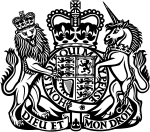Football (Offences) Act 1991

Football (Offences) Act 1991
1991 CHAPTER 19
An Act to make further provision with respect to disorderly conduct by persons attending football matches; and for connected purposes.[27th June 1991]
Be it enacted by the Queen’s most Excellent Majesty, by and with the advice and consent of the Lords Spiritual and Temporal, and Commons, in this present Parliament assembled, and by the authority of the same, as follows:—
Designated football matches. 1.—(1) In this Act a “designated football match” means an association football match designated, or of a description designated, for the purposes of this Act by order of the Secretary of State.
Any such order shall be made by statutory instrument which shall be subject to annulment in pursuance of a resolution of either House of Parliament.
(2) References in this Act to things done at a designated football match include anything done at the ground—
- (a) within the period beginning two hours before the start of the match or (if earlier) two hours before the time at which it is advertised to start and ending one hour after the end of the match; or
- (b) where the match is advertised to start at a particular time on a particular day but does not take place on that day, within the period beginning two hours before and ending one hour after the advertised starting time.
Throwing of missiles. 2. It is an offence for a person at a designated football match to throw anything at or towards—
- (a) the playing area, or any area adjacent to the playing area to which spectators are not generally admitted, or
- (b) any area in which spectators or other persons are or may be present,
without lawful authority or lawful excuse (which shall be for him to prove).
Indecent or racialist chanting. 3.—(1) It is an offence to take part at a designated football match in chanting of an indecent or racialist nature.
(2) For this purpose—
- (a) “chanting” means the repeated uttering of any words or sounds in concert with one or more others; and
- (b) “of a racialist nature” means consisting of or including matter which is threatening, abusive or insulting to a person by reason of his colour, race, nationality (including citizenship) or ethnic or national origins.
Going onto the playing area. 4. It is an offence for a person at a designated football match to go onto the playing area, or any area adjacent to the playing area to which spectators are not generally admitted, without lawful authority or lawful excuse (which shall be for him to prove).
Supplementary provisions.
1984 c. 60.
5.—(1) In section 24(2) of the Police and Criminal Evidence Act 1984 (arrestable offences), after paragraph (d) insert—
- “(e) any offence under the Football (Offences) Act 1991.”.
(2) A person guilty of an offence under this Act is liable on summary conviction to a fine not exceeding level 3 on the standard scale.
(3) In Schedule 1 to the 1989 c. 37.Football Spectators Act 1989 (relevant offences for purposes of restriction orders, &c.), after paragraph (l) insert—
- “(m) any offence under the Football (Offences) Act 1991.”.
Short title, commencement and extent. 6.—(1) This Act may be cited as the Football (Offences) Act 1991.
(2) The provisions of this Act come into force on such day as the Secretary of State may appoint by order made by statutory instrument. and different days may be appointed for different provisions.
(3) This Act extends to England and Wales only.
![]()
This work is licensed under the United Kingdom Open Government Licence v1.0.
- You are free to:
- copy, publish, distribute and transmit the Information;
- adapt the Information;
- exploit the Information commercially for example, by combining it with other Information, or by including it in your own product or application.
- You must, where you do any of the above:
- acknowledge the source of the Information by including any attribution statement specified by the Information Provider(s) and, where possible, provide a link to this licence;
- If the Information Provider does not provide a specific attribution statement, you must use the following:
- Contains public sector information licensed under the Open Government Licence v1.0.
- ensure that you do not use the Information in a way that suggests any official status or that the Information Provider endorses you or your use of the Information;
- ensure that you do not mislead others or misrepresent the Information or its source;
- ensure that your use of the Information does not breach the Data Protection Act 1998 or the Privacy and Electronic Communications (EC Directive) Regulations 2003.
- This license does NOT cover:
- personal data in the Information;
- Information that has not been accessed by way of publication or disclosure under information access legislation (including the Freedom of Information Acts for the UK and Scotland) by or with the consent of the Information Provider;
- departmental or public sector organisation logos, crests and the Royal Arms except where they form an integral part of a document or dataset;
- military insignia;
- third party rights the Information Provider is not authorised to license;
- Information subject to other intellectual property rights, including patents, trade marks, and design rights; and
- identity documents such as the British Passport.
Public domainPublic domainfalsefalse
